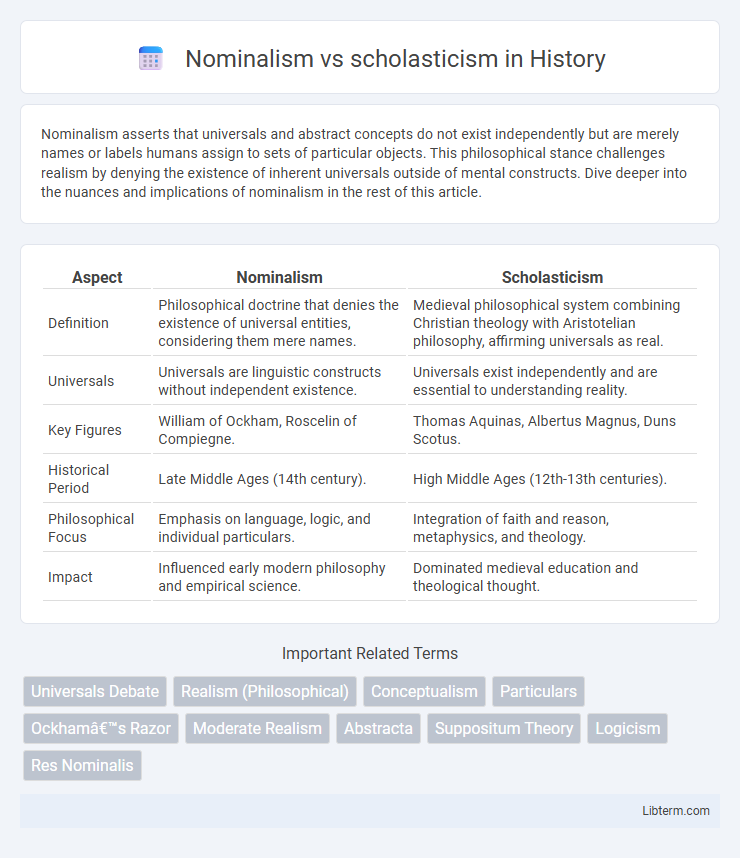Nominalism asserts that universals and abstract concepts do not exist independently but are merely names or labels humans assign to sets of particular objects. This philosophical stance challenges realism by denying the existence of inherent universals outside of mental constructs. Dive deeper into the nuances and implications of nominalism in the rest of this article.
Table of Comparison
| Aspect | Nominalism | Scholasticism |
|---|---|---|
| Definition | Philosophical doctrine that denies the existence of universal entities, considering them mere names. | Medieval philosophical system combining Christian theology with Aristotelian philosophy, affirming universals as real. |
| Universals | Universals are linguistic constructs without independent existence. | Universals exist independently and are essential to understanding reality. |
| Key Figures | William of Ockham, Roscelin of Compiegne. | Thomas Aquinas, Albertus Magnus, Duns Scotus. |
| Historical Period | Late Middle Ages (14th century). | High Middle Ages (12th-13th centuries). |
| Philosophical Focus | Emphasis on language, logic, and individual particulars. | Integration of faith and reason, metaphysics, and theology. |
| Impact | Influenced early modern philosophy and empirical science. | Dominated medieval education and theological thought. |
Introduction to Nominalism and Scholasticism
Nominalism asserts that universals are mere names without independent existence, emphasizing individual objects as the foundation of reality, contrasting with Scholasticism's belief in real universals as essential concepts underlying particulars. Rooted in medieval philosophy, Scholasticism systematically integrated Aristotelian logic with Christian theology to explain existence and knowledge. Nominalism challenges Scholastic metaphysics by rejecting abstract entities, impacting debates on language, cognition, and ontology.
Historical Origins of Nominalism
Nominalism originated in the late medieval period as a reaction against scholasticism's emphasis on universal forms and abstract metaphysical entities. Rooted in the works of William of Ockham, nominalism emphasized the primacy of individual objects and denied the independent existence of universals outside the mind. This historical shift challenged the dominant scholastic framework established by thinkers like Thomas Aquinas, redefining debates on reality, language, and logic in medieval philosophy.
Foundations of Scholastic Philosophy
Scholastic philosophy is grounded in the systematic synthesis of faith and reason, emphasizing the use of Aristotelian logic to analyze theological and philosophical questions. It asserts the existence of universal forms or intelligible essences that exist independently of individual objects, forming the basis of objective knowledge. Nominalism, by contrast, rejects universal forms as mere names or mental constructs, arguing that only particular objects are real, challenging the foundational metaphysics of scholasticism.
Key Philosophical Differences
Nominalism asserts that universals are mere names without any corresponding reality, emphasizing individual objects as the only true entities. Scholasticism, rooted in Aristotelian metaphysics, upholds that universals have real existence either in things themselves or in the mind, serving as essential concepts for understanding reality. This fundamental disagreement shapes their divergent approaches to knowledge, language, and metaphysical classification.
Leading Figures in Nominalism
William of Ockham, a pivotal figure in Nominalism, argued that universals are merely names without inherent reality outside the human mind. Roscelin of Compiegne, often considered the founder of Nominalism, emphasized language's role in categorizing objects without assuming universal forms. John Buridan contributed to Nominalism by advocating for the nominalist notion that universals are mental constructs, influencing later medieval philosophy.
Prominent Scholastic Thinkers
Prominent Scholastic thinkers such as Thomas Aquinas, Albertus Magnus, and Duns Scotus shaped medieval philosophy by defending realism against nominalist skepticism. Thomas Aquinas integrated Aristotelian metaphysics with Christian theology, advocating for universals' real existence in particular things. Duns Scotus emphasized the formal distinction and individuality, while Albertus Magnus contributed extensively to natural philosophy, reinforcing the scholastic commitment to universals and objective reality.
Impact on Medieval Thought
Nominalism challenged the dominant scholastic belief in universals by asserting that only individual objects exist, which shifted medieval philosophical discourse toward empirical observation and individual experience. Scholasticism, rooted in Aristotelian logic and theology, structured medieval education and reinforced the synthesis of faith and reason, shaping theological doctrines and intellectual inquiry. The tension between nominalism and scholasticism catalyzed critical examination of metaphysics and epistemology, influencing later developments in Renaissance humanism and early modern philosophy.
Debates on Universals
Nominalism argues that universals are mere names without independent existence, emphasizing individual objects as the only realities, while scholasticism maintains that universals exist either as real entities (realism) or as concepts in the divine mind. The debates on universals during the medieval period centered on whether properties like "redness" or "humanity" have objective reality or are simply linguistic constructs. This philosophical dispute influenced theological interpretations, metaphysical frameworks, and the development of early modern science.
Influence on Modern Philosophy
Nominalism challenged the realism of Scholasticism by rejecting the existence of universal forms outside the mind, which laid the groundwork for empirical and individualistic approaches in modern philosophy. Scholasticism's emphasis on reconciling faith with reason influenced the development of systematic theology and metaphysics, shaping early modern philosophical inquiries. The debate between Nominalism and Scholasticism fostered critical examination of abstract concepts, directly impacting thinkers like Francis Bacon and John Locke in their pursuit of knowledge based on experience and reason.
Lasting Legacy and Contemporary Relevance
Nominalism challenged the universal abstractions central to scholasticism, reshaping medieval philosophical discourse and influencing modern empiricism and analytic philosophy. Scholasticism's systematic approach to theology and philosophy established the foundation for Western intellectual tradition and university curricula, persisting in contemporary theological studies. Both movements continue to impact debates on language, metaphysics, and epistemology within philosophy and cognitive science.
Nominalism Infographic

 libterm.com
libterm.com